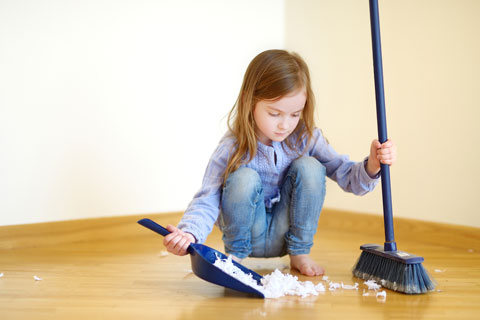Doing simple chores helps preschoolers feel responsible and useful at home and in child care.

When children do real work, they gain…
- “Know-how.” Putting things in order and making things clean are basic “life skills.”
- A sense of competence. Preschoolers like to feel that their contributions matter.
- A sense of cooperation. Doing chores together allows children to experience the rewards of working as a team.
Take time for training.
Preschool children need step-by-step directions for new tasks, and chances to practice. They may need friendly reminders about familiar tasks, too. Remember that such guidance is an investment in the future. Pictures of children performing tasks may also be helpful.
Assign chores wisely.
- Let children choose from a list of tasks. Job charts or chore lists can help them remember their jobs.
- Keep instructions and tasks simple. “Put everything away” is an intimidating order. Instead, you might say, “Please put these books on the shelf. Then come tell me when you’re done.” It also helps to have a set time of day to finish tasks.
- It’s best to postpone her chores if she is hungry, thirsty, tired, or ill.
- Tasks for preschool children should not involve hot water, heavy equipment, animal or human waste, or toxic chemicals!
Start small.
Jobs for preschoolers can include self-care tasks (brushing teeth, getting dressed, etc.), pet care tasks, garden tasks, sorting clothes or mail, and helping make shopping lists. Preschoolers can also help clear the table, find items in the store, and help return books to the library.
Offer the right tools.
A spray bottle of water and small cleaning rags or sponges can help with wiping down surfaces. You can use old clean socks for dusting. Brooms and garden tools should be child-size.
Encourage with words and fun.
- Have fun while you work together: “Let’s pretend we’re helpful robots.”
- Focus on effort: “How did you keep the baby laughing while I cooked?”
- Focus on finishing: “Want to relax with a book after we put the groceries away?”
- Give positive feedback when you inspect a child’s work. If something could be better, wait until next time to give more detailed instructions.
Your example matters.
If you complain about your chores, children may begin to complain, too. Help them see the satisfaction of a job well done. “Shaggy’s coat will look so silky after you brush her!” Express good feelings: “I like to work with you!”


 Printer-friendly PDF
Printer-friendly PDF Printer-friendly PDF
Printer-friendly PDF